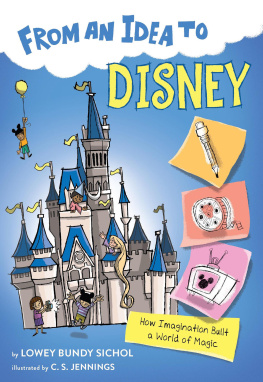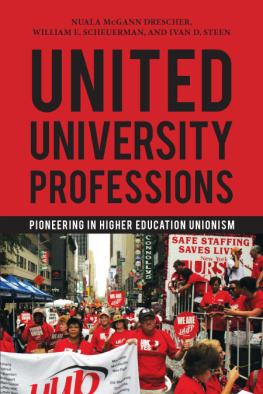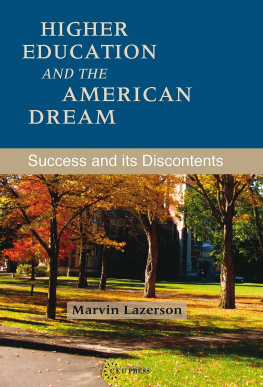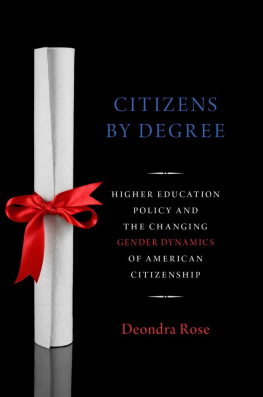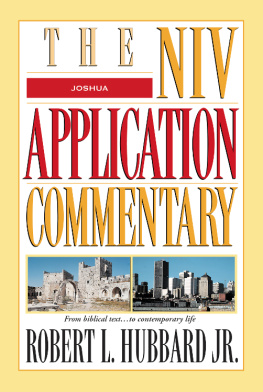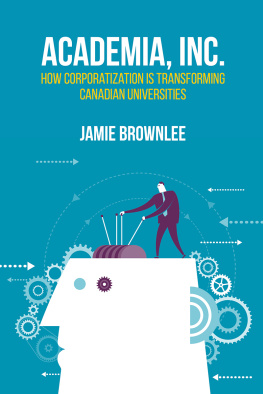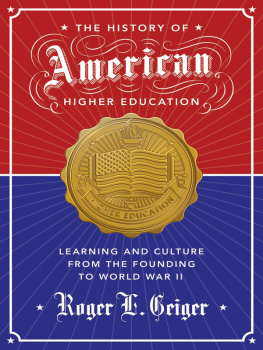Joshua Hunt - University of Nike: How Corporate Cash Bought American Higher Education
Here you can read online Joshua Hunt - University of Nike: How Corporate Cash Bought American Higher Education full text of the book (entire story) in english for free. Download pdf and epub, get meaning, cover and reviews about this ebook. year: 2018, publisher: Melville House, genre: Detective and thriller. Description of the work, (preface) as well as reviews are available. Best literature library LitArk.com created for fans of good reading and offers a wide selection of genres:
Romance novel
Science fiction
Adventure
Detective
Science
History
Home and family
Prose
Art
Politics
Computer
Non-fiction
Religion
Business
Children
Humor
Choose a favorite category and find really read worthwhile books. Enjoy immersion in the world of imagination, feel the emotions of the characters or learn something new for yourself, make an fascinating discovery.

- Book:University of Nike: How Corporate Cash Bought American Higher Education
- Author:
- Publisher:Melville House
- Genre:
- Year:2018
- Rating:4 / 5
- Favourites:Add to favourites
- Your mark:
- 80
- 1
- 2
- 3
- 4
- 5
University of Nike: How Corporate Cash Bought American Higher Education: summary, description and annotation
We offer to read an annotation, description, summary or preface (depends on what the author of the book "University of Nike: How Corporate Cash Bought American Higher Education" wrote himself). If you haven't found the necessary information about the book — write in the comments, we will try to find it.
Joshua Hunt: author's other books
Who wrote University of Nike: How Corporate Cash Bought American Higher Education? Find out the surname, the name of the author of the book and a list of all author's works by series.
University of Nike: How Corporate Cash Bought American Higher Education — read online for free the complete book (whole text) full work
Below is the text of the book, divided by pages. System saving the place of the last page read, allows you to conveniently read the book "University of Nike: How Corporate Cash Bought American Higher Education" online for free, without having to search again every time where you left off. Put a bookmark, and you can go to the page where you finished reading at any time.
Font size:
Interval:
Bookmark:
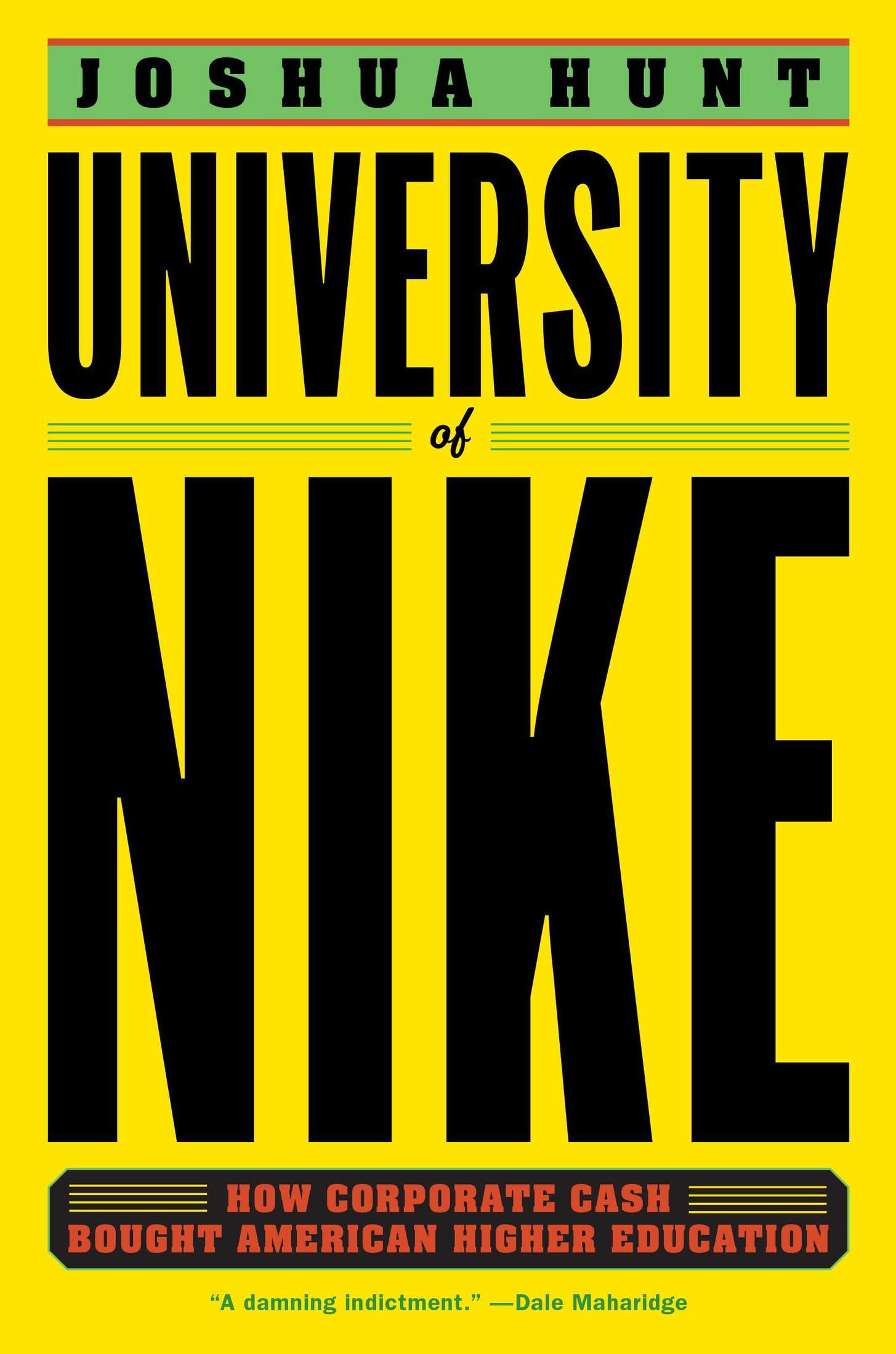
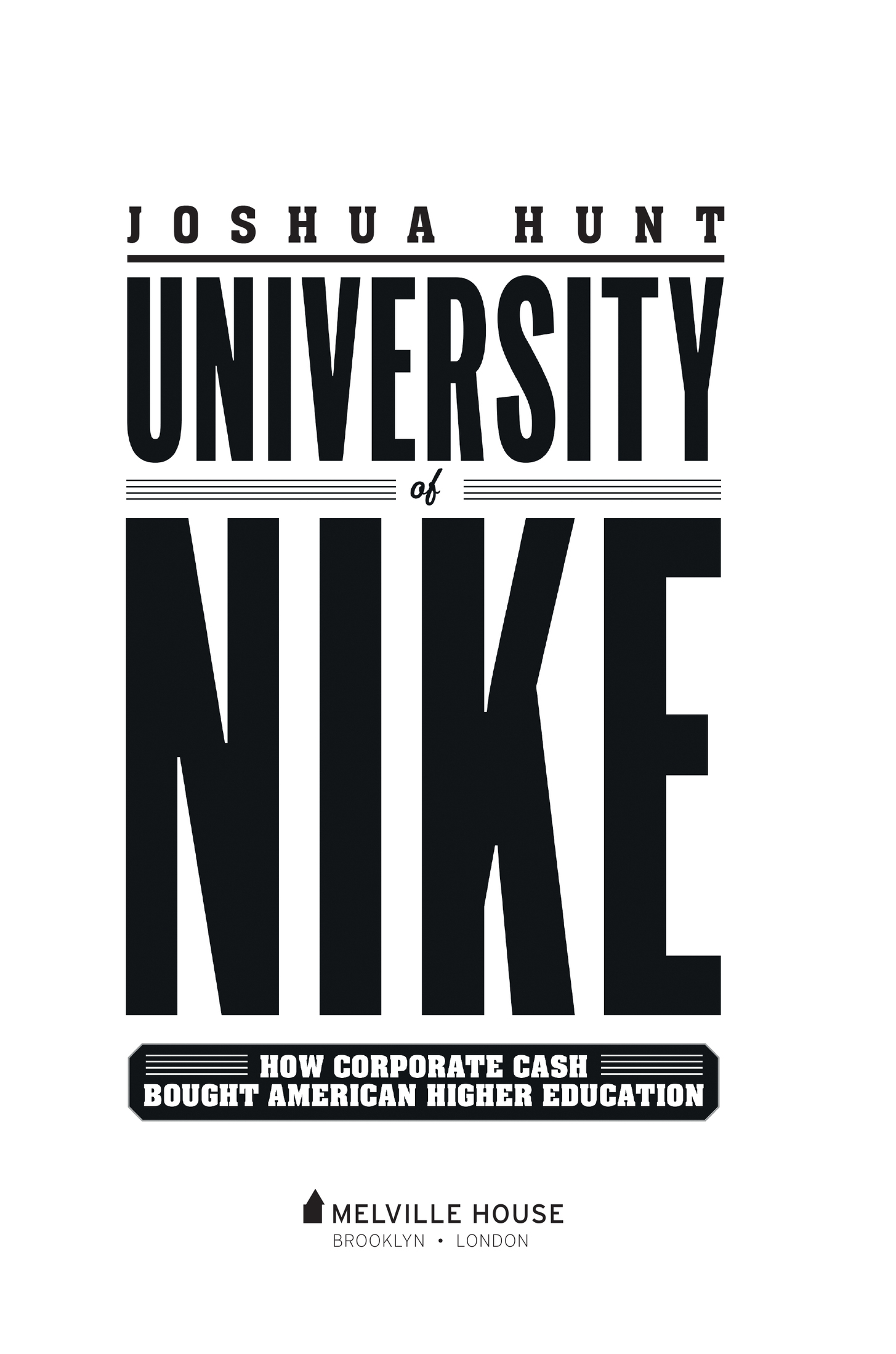
University of Nike
Copyright 2018 by Joshua Hunt
First Melville House Printing: October 2018
Melville House Publishing
46 John Street
Brooklyn, NY 11201
and
Suite 2000
16/18 Woodford Rd.
London E7 0HA
mhpbooks.com
@melvillehouse
ISBN:9781612196916
Ebook ISBN9781612196923
Designed by Euan Monaghan
Library of Congress Cataloging-in-Publication Data
Names: Hunt, Joshua, author.
Title: University of Nike : how corporate cash bought American higher education / Joshua Hunt.
Description: Brooklyn : Melville House, [2018].
Identifiers: LCCN 2018037658 (print) | LCCN 2018039298 (ebook) | ISBN 9781612196923 (reflowable) | ISBN 9781612196916 (hardback)
Subjects: LCSH: University of OregonFinance. | Academic-industrial collaborationOregon. | College sportsCorrupt practicesOregon. | Nike (Firm) | BISAC: SPORTS & RECREATION / Business Aspects. | EDUCATION / Educational Policy & Reform / General.
Classification: LCC LD4353 (ebook) | LCC LD4353 .H86 2018 (print) | DDC 378.795/31dc23
LC record available at https://lccn.loc.gov/2018037658
v5.3.2
a
In May 2014, I traveled to Eugene, Oregon, to cover a developing story for The New York Times: two months earlier, a freshman at the University of Oregon had told local police shed been gang-raped by three of the schools basketball players. Campus police were aware of the incident just hours after it occurred, and university administrators knew by the following day. But instead of alerting the campus community and suspending the players, they kept the matter quiet and allowed the men to participate in the NCAA basketball tournament.
Throughout March and April, the schools public relations department worked on a media strategy to employ in case the story broke; school administrators quietly brokered a deal that would allow the accused players to transfer to another institution at the end of the academic year, with no incriminating paperwork that might follow them; and campus police were careful to omit from the schools public crime log any mention of the report. When May arrived, it looked as though the school had managed to avoid a major scandal. Then the Eugene Police Department released a graphic twenty-four-page police report the victim had filed, sparking intense media coverage that led to the suspension of the players and, several months later, the resignation of the universitys president, Michael Gottfredson.
I was left with a number of nagging questions: Why had the school recruited one of these players despite the fact that his previous college had suspended him for sexually assaulting a fellow student? Why were the players allowed to keep playing basketball with such serious charges hanging over their heads? And why did the school ignore federal laws requiring them to notify the public when crimes of this nature were reported to campus police?
University administrators refused to talk with me, and occasionally locked themselves in their offices until I left the buildings where they worked. The players also refused to talk with me, while their lawyers insisted that the sex had been consensual. The schools office of public records produced mostly useless, heavily redacted records concerning its handling of the incident, and even the schools public relations professionals proved to be tight-lipped: before turning down each of my requests for an interview with some administrator or another, the director of public affairs, Tobin Klinger, would always ask me the same question: Whats your angle?
And each time I told him I wouldnt have an angle until my notebook was filled with more answers than questions.
I began to hear troubling stories about the University of Oregons relationship with Nike. Over the course of two decades, the shoe and apparel companys founder, Phil Knight, had become the schools most generous donor. They called him Uncle Phil, not just on campus but around town, and it was easy to see whywhen my parents moved the family away from Eugene, in 1995, it was a quiet college town filled with young hippies and former millworkers. Nearly two decades later, it was Niketown, U.S.A.
The University of Oregon, which was once a cash-strapped liberal arts college, had been transformed into a college football powerhouse with an increasingly competitive basketball program. The change was so swift and dramatic, and so obviously tied to Knights largesse, that Oregons rivals gave it the derisive nickname the University of Nikean image it has now embraced. Other schools are embracing that kind of image as well: in 2016, the University of Michigan announced a $169 million contract with Nike, which was the biggest in the history of college sports, until the University of Texas at Austin inked a $250 million Nike deal just months later.
It all began nearly thirty years ago, when Oregonians became the first in the nation to abandon their public universty system by voting for property tax cuts that left state colleges to fend for themselves. A decade later, dozens more states had set out on the same path, which has led us here: in 2017, for the first time, public colleges and universities in most states drew the majority of their revenue from tuition dollars rather than taxpayer support. The American public has, in other words, become a minority shareholder in the nations public universities. And what happens next is all too clear if you know where to look.
I began with a notebook full of questions, a campus full of rumors, and a sense that the University of Oregon was a canary worth following down a coal mine. My goal was not to write a biography of Phil Knight, whose life and career have been documented more extensively, and more flatteringly, in books authored by his friends, his colleagues, and himself. If my portrait of Knight seems overly critical, it is because Ive sought to document a narrow slice of his life that has proven to be consistently controversialnamely, the extent to which his financial support of the University of Oregon has bought him influence over an institution that is meant to serve public, rather than private, interests. Four years after I began investigating Knights dealings with the university, my notebook had far fewer questions than answers, thanks to well over a hundred interviews, supplemented by many thousands of pages of financial, legal, and archival documents.
At last, I have my angle.
Philip Hampson Knight was seven years old the first time his father took him to a college football game. It was November 3, 1945, and just a few months had passed since the end of the Second World War. Many universities around the country were fielding teams for the first time in two or three years, and fans were eager to see young American men return from the battlefield to the football field. In Portland, Oregon, where the Knight family lived, some 28,000 peopleone out of every ten residents of the citystreamed into Multnomah Stadium for the afternoon game, braving overcast skies and periodic showers that had turned the grassy field to mud.
Oregon vs. Washington, Knight recalled. I asked, Dad, which is the good team?
When answering the question, William Knight disregarded the fact that Oregon was losing more games than it was winning that season, and that the Washington Huskies were perched atop the resurgent Pacific Coast Conference. More than athletic excellence or national acclaim, loyalty seemed to be foremost in Knights mind when he told his son that Oregon was the team he should support.
Font size:
Interval:
Bookmark:
Similar books «University of Nike: How Corporate Cash Bought American Higher Education»
Look at similar books to University of Nike: How Corporate Cash Bought American Higher Education. We have selected literature similar in name and meaning in the hope of providing readers with more options to find new, interesting, not yet read works.
Discussion, reviews of the book University of Nike: How Corporate Cash Bought American Higher Education and just readers' own opinions. Leave your comments, write what you think about the work, its meaning or the main characters. Specify what exactly you liked and what you didn't like, and why you think so.

